 Pamela King, BS, CRHCP
Pamela King, BS, CRHCPDirector
Phoebe Sumter Ellaville Clinic
Ellaville, Georgia
I’m the Director of the Phoebe Sumter Ellaville Clinic’s Rural Health Clinic and the Georgia Farmworker Health Program. I provide administrative and operational support to the program.
With the leadership and support of Phoebe Sumter Medical Center’s CEO, Carlyle Walton, and VP Controller, Michelle Doggett, we’ve positively impacted the community. We relocated to a new facility in August 2017 and can provide various services to the rural health community, including EKGs, bloodwork, women’s health, and Vaccines for Children (VFC). We accept walk-ins and provide services on Saturdays to ensure patients have every opportunity to receive care.
We worked with the Sumter County Health Department to conduct a free community health fair. We performed blood pressure and glucose tests, height/weight checks, and STD/HIV testing. I knew we were victorious because of the number of participants and the community’s praise afterward. The advertising, support from the community, and dedicated staff contributed to our success.
The “Power of Rural” means helping a needy community by providing excellent medical care and services.
I was inspired to work in rural health because it allows me to do the two things I love: helping people in need and being of service to the community.
I’ve worked on numerous projects through the SORH office in Cordele for many years. They’ve assisted me with grant purchases and general advice regarding the program. They are very knowledgeable and are excellent resources.
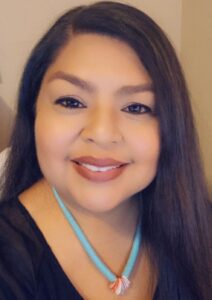 Holly Figueroa
Holly Figueroa Tribal Liaison, Blue Cross Blue Shield of Arizona Health Choice
President, Arizona Rural Health Association
Flagstaff, Arizona
As the Tribal Liaison for Blue Cross Blue Shield of Arizona (BCBSAZ) Health Choice and the President of the Arizona Rural Health Association (AzRHA), I work to strengthen tribal relations with tribes, focusing on access to care, prevention, coordination of care, nation building, training and education, health disparities and stigma reduction, and cross-sector tribal collaborative efforts. I also focus on rural communities and rural health issues.
I work hard to promote cultural humility in all areas of health and wellness. This is key to building trust and relationships within our healthcare systems and those they serve. The organizations I am a part of make a difference through advocacy, education, and collaboration. We have opportunities to communicate with legislators to discuss rural and tribal issues. Additionally, AzRHA secured a grant to participate in the All of Us Program and worked with students to collect and study data to improve health.
The Arizona Center for Rural Health collaborated with AzRHA to host the Federal Office of Rural Health Policy Region D meeting, bringing together nine states and multiple federal and national partners to discuss critical healthcare system transformation issues. As part of the meeting, I coordinated a tour of the Hopi Reservation to provide a firsthand experience of what accessing health care in a rural tribal community is like. We visited a village on the mesa and the local health care clinic, and we met with village leadership, tribal program leaders, and Indian Health Service leadership/professionals. This experience created awareness of how tribes can leverage culture in their respective health journeys. It helped to create connections between NOSORH, other State Offices of Rural Health, and Arizona rural leaders. This project wouldn’t have been possible without established relationships with tribal leaders, tribal programs, and other rural health organizations.
BCBSAZ Health Choice is currently working to address maternal health as a health disparity, as the lack of obstetric services is a big challenge. I am addressing it from an indigenous and rural perspective, exploring programs and doula services to increase access to care. Additionally, I am a certified Mental Health First Aid trainer in the Adult, Youth, Indigenous Youth, and Veteran disciplines, and I have trained across Arizona since 2016. I love empowering communities to care for one another, especially in rural areas where there aren’t always quick response times.
“Power of Rural” is community. Rural communities are places where people know one another and are able to come together.
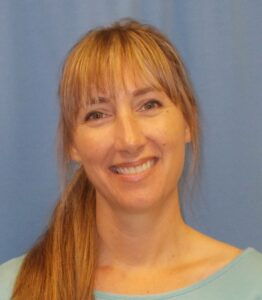 Lisa Rantz
Lisa Rantz President
Hawaii State Rural Health Association
Hilo, Hawaii
I have served as President of the Hawaii State Rural Health Association for the past four years. When I took on the position, the Association was all volunteer-led and only received a $9,500 grant from the National Rural Health Association. The Association now has multimillion dollars’ worth of grants and a full-time Executive Director, two full-time program coordinators, and two part-time staff members. I love to build systems that support access to high-quality healthcare services close to home. This is an essential right that all of our rural residents deserve.
One positive impact is finally obtaining county-wide Health Professional Shortage Area (HPSA) designations for all our rural counties across the state. The designations went into effect in January 2020, and the first 10% automatic quarterly payment went out to providers and healthcare organizations in March 2020 – just as the pandemic shut down our state. This payment helped to bridge the gap until emergency funding came in to help keep medical providers in practice. This is just one way we help support a robust healthcare workforce and keep access to healthcare services available for rural residents.
Our coordinated healthcare assessment, Access to Care, involved bringing together traditional healthcare stakeholder groups, non-profit service organizations and community members to develop surveys for providers and community members to have their voices heard and indicate if they are able to receive health care when they need it on the island or if they had to fly off island for care. We also gathered data on whether rural communities were better or worse off since the pandemic. The service groups were helpful for the dissemination of surveys from a trusted and familiar organization. We knew we were successful by the number of surveys completed; we even exceeded the Governor’s survey in the number of surveys completed! We were able to create a strong rural voice for our legislators to pay attention to and come up with solutions to meet rural healthcare needs. We plan to do a follow-up survey to assess the healthcare needs following the devastating Maui wildfire.
Through our RCORP grant, we support a behavioral health initiative called UTelehealth (in partnership with the University of Hawaii Area Health Education Center), which provides mental health services free of charge for all rural residents.
The “Power of Rural” resonates with me because we have such strong connections in our rural communities that we are able to mobilize quickly and collaborate to get things done.
I want to perform work that makes a difference in people’s lives. Stand up and speak for those that are underrepresented.
 Steve Simonin
Steve Simonin President/CEO
Iowa Specialty Hospital and Clinics
Clarion, Iowa
I have been the President and CEO of Iowa Specialty Hospitals & Clinics for over 27 years. During that time, we’ve grown from one hospital to two hospitals with 11 clinics, from 100 employees to around 800, and from five providers to over 100. I strongly advocated for Critical Access Hospitals and worked to bring the program to Iowa.
Our organization believes in pushing the envelope of what can be accomplished in a rural health setting. We’ve worked diligently to bring behavioral health services to our communities and established this service in our local school systems. We have provided healthcare to many smaller communities that otherwise would have to travel to seek care. Communities see a positive economic impact as we are one of the top employers in our area, which also leads to taxpayer dollars being kept in these rural settings.
We offer a wide variety of services, but two main focus areas are maternity and behavioral health. We are seen as an oasis in an OB desert, as many other hospitals no longer provide maternity care. We’ve seen this service grow from an average of 80 deliveries per year to over 650 deliveries annually, facilitating our latest construction project of expanding our maternity center. As the need for behavioral health services continues to grow, we have made it our mission to become a resource for those seeking help. Our providers are in seven of our nine locations and have offices in seven area school systems. This accentuates our belief in caring for more than just the physical needs of our patients.
Employee recruitment has been a struggle for our system, so we continue to develop unique ways of recruiting. We’ve established a summer intern program to pique interest in healthcare careers with area high schoolers. As a partner with area colleges, we provide opportunities for student nurses to earn hands-on experience. In doing so, we created a Cultivators program that aids students with their school fees while establishing a commitment to future employment with us.
To me, the Power of Rural can be summed up with the word “pride.” In rural areas, we don’t take what is available to us for granted, and we have an exceedingly high appreciation for the businesses and amenities in our communities.
Through rural health, I get to be involved in all aspects of our system. I can see the impact our system has on the communities we serve and the residents who live there. I believe rural health chose me more than I chose it, and for that, I’m very grateful.
 Crystal Landry, RN, RHCEOC
Crystal Landry, RN, RHCEOCCEO
Penobscot Valley Hospital
Lincoln, Maine
Crystal Landry was selected for her tireless commitment to ensuring health services are accessible to the people of her community and as an advocate for rural areas throughout Maine.
As the CEO of Penobscot Valley Hospital (a Critical Access Hospital), I am responsible for the delivery of healthcare services to our rural community. As nearly the largest employer in the region, the work and care provided are critical for patients living there. Every day, we strive to work together to improve the health and well-being of those we serve, providing local access to high-quality primary care and inpatient and outpatient healthcare services.
Success is measured by positive patient clinical outcomes and making a difference in the lives we care for with compassion. Establishing formal and informal collaborative partners to improve access is of great importance and focus. We collaborate with specialists, patients, and our staff to understand the needs of our community. Responding to and impacting the ever-evolving healthcare landscape is critical.
Penobscot Valley Hospital successfully completed a Chapter 11 bankruptcy restructuring in 2021. This restructuring of the finances – legacy debt – ensured access to healthcare services remains available for the community.
Collaboration to ensure those living in rural areas have access to high-quality healthcare services.
After many years of working in larger hospital environments, I wanted to give back and serve more rural areas – the same communities where I live and raise my family.
We have worked very closely with our State Office of Rural Health over the years, most closely during bankruptcy and through COVID challenges. The support and programs offered are critical for rural hospitals.
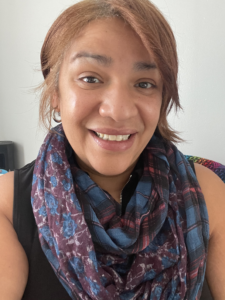 Rosa Fernandez
Rosa Fernandez Program Director
Health Equity Partnership of North Central MA (CHNA9)
Leominster, Massachusetts
Rosa has gone above and beyond in her work for rural communities throughout North Central Massachusetts. She has connected with people across the region, distributed thousands of free COVID-19 test kits to community members, and started several new programs. Rosa began a North Central MA chapter of the Massachusetts Women of Color Coalition. She convened a BIPOC Behavioral Health Provider Network in the region, which is working to build community among and resources for BIPOC behavioral health providers, including BIPOC students who hope to become clinicians. In addition, Rosa has played an integral role in maintaining the existing programs of the Health Equity Partnership, including significant engagement around the region’s Community Health Improvement Plan and the Anchor Collaborative, a regular convening of the region’s anchor institutions.
In my current role as Program Director of the Health Equity Partnership of North Central MA, I am responsible for leading and directing outreach efforts that specifically address issues that impact the health and wellness of the community. I identify, organize, and implement several programs and services that focus on our underserved, diverse rural populations.
I completed a Youth Civic Leadership program for youth in rural communities to develop leadership, civic engagement, and public speaking skills. I began the program by identifying and partnering with youth-serving organizations in the area (Luk Inc., Boys & Girls Club, YMCA, and Youth Venture). Our youth leaders were trained and facilitated an advocacy project, engaging them as citizen-leaders in a complex political and cultural environment and encouraging them to advocate on the issues most important to them. Multiple students from this program spoke to a large audience of local legislators and policymakers at the Health Equity Partnership’s annual legislative breakfast.
Improving, understanding, and promoting rural health care, and development of opportunities in our rural areas.
I am devoted to building a healthier community through education and community health improvement projects that bring change and build pride, dignity, cultural humility, and motivation in the communities we serve.
I enjoy working with our partners in our State Office of Rural Health. We have built trusted relationships, and they have given me and my colleague the tools and resources to do our best in the delivery of our work.
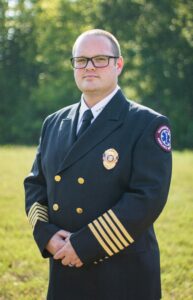 Justin P. Duncan, MSc, BS, NRP, CCEMT-P, FP-C
Justin P. Duncan, MSc, BS, NRP, CCEMT-P, FP-C CEO, Washington County Ambulance District
President, Missouri EMS Association
Co-Founder, Washington County MIH Network
Mineral Area, Missouri
I have a long history in EMS, serving as both a ground and air EMS Clinician. I have served as an EMS instructor, line-level supervisor, department manager, regional director, and now CEO. Given my history of dedication to health care and passion for education, my career naturally progressed into both education and leadership.
Good health is more than good medical care. My team and I are constantly looking for new ways to bring innovative therapies into the prehospital setting that meet the needs of the whole person. Through mobile integrated healthcare (MIH), we have improved patient health and wellness (medical, social and emotional), patient health outcomes, and access to resources. We have also reduced healthcare costs by more than 50% across the board.
The project I’m most passionate about is our MIH program. I’ve seen it personally change lives for the better. This work could not have been achieved without the team within my agency, my valued local and state-level partners, and, most importantly, the partner organizations that comprise the Washington County Mobile Integrated Healthcare Network. Collectively, we knew MIH was successful following the pandemic. We saw significant health improvement in the patients we were serving. Our success could be attributed to a willingness to explore different ways of doing business and investing the time, effort, and resources to make it happen. Involving local, state and federal stakeholders and policymakers early in the process was also a contributing factor.
Our MIH program initially began as a small pilot program focused on 21 diabetic patients and has now grown to include individuals with other chronic diseases, particularly heart disease. We also provide services for SUD/OUD and behavioral health patients and will implement maternal health in the coming months.
The “Power of Rural” is that we naturally work together or band together to resolve problems. We must be creative and innovative because we don’t have the same resources as metropolitan areas.
We could not have achieved the level of success for which we have been recognized without their early interest, support, and connections. They are active partners. They are involved in the conversation, provide feedback and look for resources to support our work. We view them as an integral part of our team.
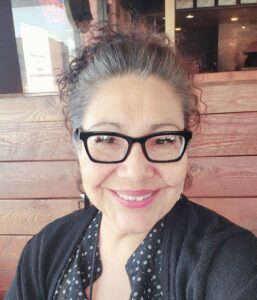 Stephanie Iron Shooter
Stephanie Iron Shooter Office of American Indian Health Director
Montana Department of Public Health & Human Services
Billings, Montana
Stephanie is a member of the Sicangu (Burnt Thigh) Oyate (People) from the Rosebud Sioux Tribe in Rosebud, South Dakota, and of the Aaniiih (Whiteclay) Anin (People) from the Fort Belknap Indian Community in Montana. Her career and life’s work have been focused on collaborating with Montana Tribes to address health disparities through the utilization of cultural strengths. Stephanie’s innate cultural value systems allow her to focus on building positive, progressive relationships for the common good of all people. Her early career centered around domestic violence and substance use prevention in Indian country. She sits on the state Native American domestic violence fatality review team. She also directed a grant at the Office of Public Instruction to implement a wraparound process in schools that served primarily American Indian students. Wraparound is a process that allows the youth voice to be elevated in the delivery of mental health services. She continues to make a difference in rural communities across the state. Her connections to rural run deep, and she brings a positive light and energy to everyone who works with her.
The Director of the Office of American Indian Health is responsible for identifying health disparities, developing health equity strategies, overseeing collaborative efforts between State, Tribal and local health agencies using data and local input, and providing a forum for addressing tribal-state health issues. Montana became one of the first states in the country to create a Director of American Indian Health position under an Executive Order of the Governor.
We have contracted with the Montana Office of Rural Health to create and disseminate training modules titled Caring for Indigenous Montanans. We are in the process of creating these modules and look forward to sharing them.
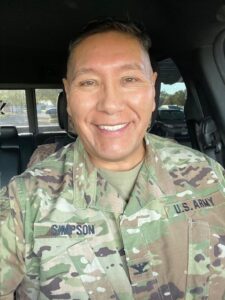 Loren Simpson, MD
Loren Simpson, MD Physician
South Lyon Medical Center
Yerington, Nevada
I am the Emergency Department Medical Director at South Lyon Medical Center (SLMC). Emergency, urgent care and sports medicine are my passions. I volunteer with youth athletic groups such as USA Boxing and provide medical coverage for rodeo events and mixed martial arts. When I am not working with SLMC, I am also on staff with our local tribal healthcare entities and am a Colonel in the Army Reserve. My military career has augmented my skill set practicing in rural Northern Nevada and vice versa.
SLMC provides crucial access to health care in rural Nevada. The hospital is a valuable community resource that has grown to accommodate the changing trends in modern medicine. Specifically, a new venture is in development as we battle addiction and the opioid crisis.
SLMC has successfully recruited and retained University of Nevada-trained physicians who are invested in the health care of our community. SLMC and its professional staff actively engage with and mentor University of Nevada student nurses, medical students, and residents to foster and recruit quality healthcare professionals.
SLMC benefits from its strong ties to the University of Nevada Medical School and Family Medicine residency program with specialty care in Women’s health and obstetrics, routinely scheduling patients at our facility. SLMC is currently in the early stages of developing a program to assist patients with opioid dependence.
“Power of Rural” embodies life in small-town Nevada. One learns to adapt, overcome, and adjust to living here. It’s a choice and is driven by culture, family and our history.
Growing up on a rural Indian reservation, my family had zero convenient access to health care without driving two hours to Schurz. That just could not be the standard of care. My entire career has been focused on improving health care for our rural communities.

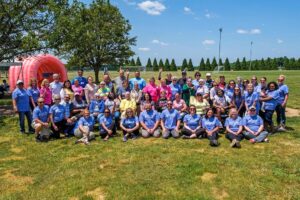 Inspira Health
Inspira Health (Donald Noblett, MPH, NCTTP, Cancer Grants Manager)
Mullica Hill, New Jersey
Cumberland County has been ranked the unhealthiest county in New Jersey for 12 of the last 13 years. Through education and preventative services, Inspira is helping improve the health of these communities – and the greater South Jersey region at large – by connecting individuals with the health care they need. We offer free cancer screenings across our counties through the NJCEED (New Jersey Cancer Education & Early Detection) Program and the ScreenNJ Lung Cancer Program, introduced a mobile mammography screening van with great success, and provide free tobacco cessation services and Nicotine Replacement Therapy. Inspira also advocated for the New Jersey Public Options Hospital Fee to be expanded to five additional counties to help ensure continued access to healthcare services for underserved and vulnerable patients. This will support our plan to expand Inspira’s Community Health Worker Program.
Through NJCEED, we’ve partnered with CompleteCare and Famcare to improve cancer screening rates among uninsured and underinsured community members. Our full-time outreach worker has elevated the success of these partnerships, adding a personal touch to the patient experience. Through a combination of patient navigation, provider education and patient incentives, we’ve been able to increase cancer screening completion rates.
We recently received funding to launch a Hospital-Based Violence Intervention Program designed to enhance the delivery of clinical and behavioral health services to victims of gun violence- and their immediate families- in Gloucester and Cumberland Counties. It reaches victims when they need it most – in the immediate aftermath of a violent incident – with crisis intervention, conflict mediation, victim compensation, mental health care, and substance use interventions so they can start their healing process.
We saw and heard firsthand the need for transportation services to help get individuals to free cancer screenings, preventative care, and treatment appointments. Through a series of funding, partnerships, and budget allocations internally, we’ve expanded our transport program to support physical access to care for patients. We’re thankful for the financial support of many organizations that have helped make accessible, affordable care possible.
The “Power of Rural” describes the innovative and collaborative work in rural communities to improve health outcomes. Innovative solutions are being implemented to help community members overcome barriers and promote health. The work being done in some of the most rural parts of New Jersey is being duplicated in less rural parts of the state, demonstrating how the “Power of Rural” can positively impact every New Jersey resident.
The New Jersey Office of Primary Care and Rural Health continues to be an incredible partner. The leadership, organization, and advocacy they offer have helped raise awareness about the availability of programs and services across the state.